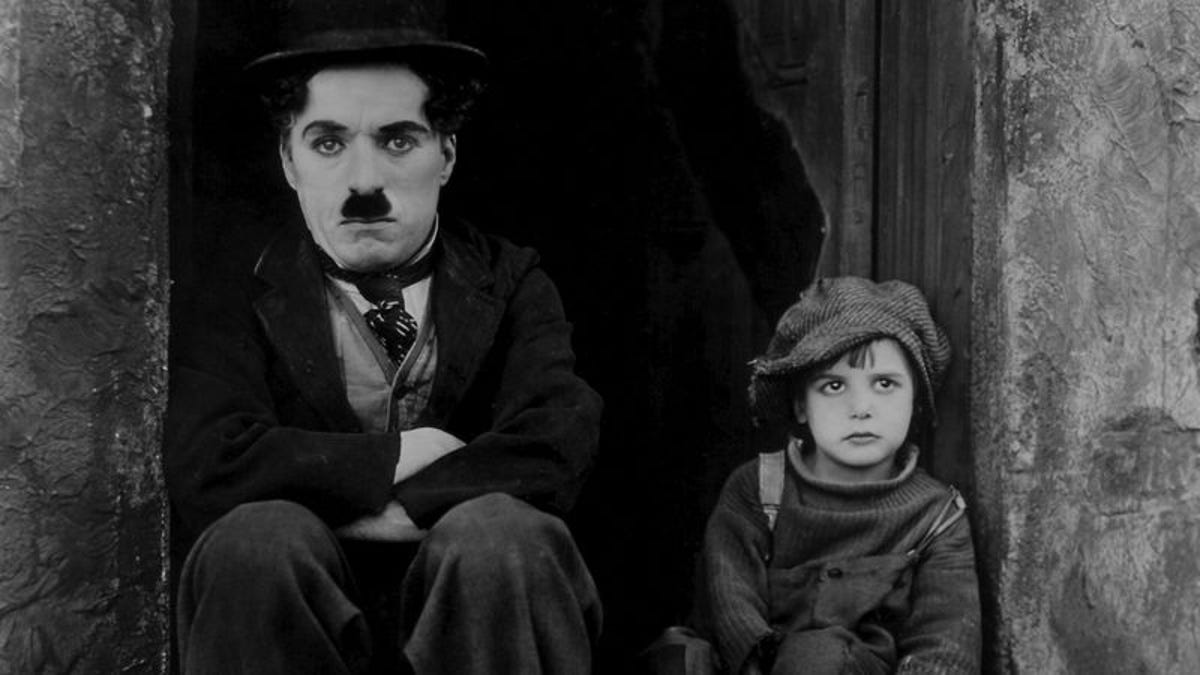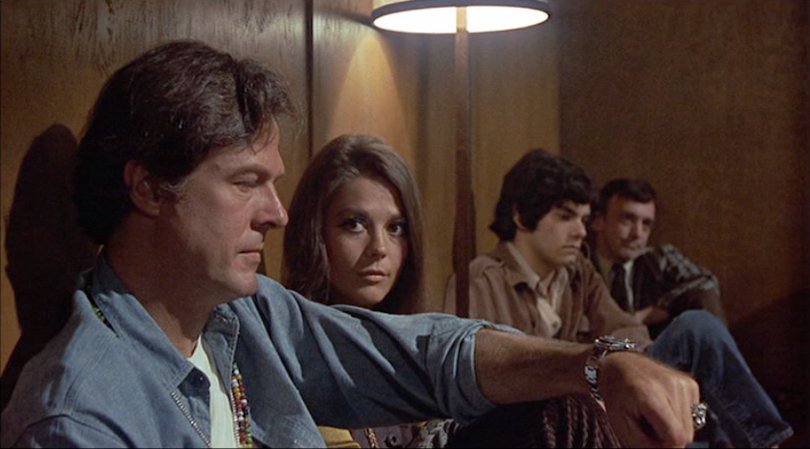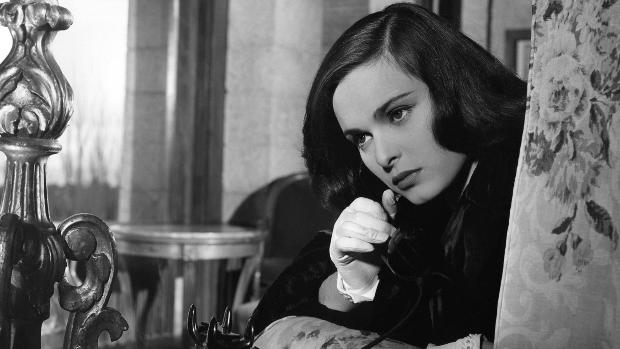For years, I've been working on a list of "my favorite movie from each year of the last 100 years." It'll still take me a while to finish, but since we're all binging movies during the coronavirus situation, I'm going to give you a sneak preview…
So here's a sampling of one movie for each decade from my upcoming list. The final list will have a lot more to it than this — not just 10+ times as many movies, but also extra content about each one.
If you like this list so far, stay tuned — I'll be posting the list of all 100+ movies on this blog and my Facebook page once it's done.
From the 1920s:
The Kid (1921) (Charlie Chaplin, Jackie Coogan/dir. Chaplin)
Watch on YouTube. (This is in the public domain, so it's freely available.)

From the '30s:
A Night at the Opera (1935) (Groucho Marx, Harpo Marx, Chico Marx, Margaret Dumont, Allan Jones, Kitty Carlisle, Sig Ruman/dir. Sam Wood)
If you have a Roku, you can watch this movie on the channel called "My Retro Flix" (free with ads). Once you're in the channel, click "movies," then click "comedy," then scroll through to the 9th movie in that section. (If you'd rather pay than watch ads, you can rent it for $2.99 on Amazon.)

From the '40s:
The Strange Love of Martha Ivers (1946) (Barbara Stanwyck, Van Heflin, Kirk Douglas, Lizabeth Scott, Janis Wilson, Judith Anderson/dir. Lewis Milestone)
Watch on Amazon Prime. (And since this movie is in the public domain, you can find it in many other places too, like YouTube.)
This was the movie debut of Kirk Douglas, who died earlier this year at age 103.

From the '50s:
Some Like it Hot (1959) (Marilyn Monroe, Tony Curtis, Jack Lemmon, George Raft, Joe E. Brown/dir. Billy Wilder)
Watch on Amazon Prime. [Update: a few months after I first posted this, Amazon started charging to rent the movie.]

From the '60s:
Bob & Carol & Ted & Alice (1969) (Natalie Wood, Elliott Gould, Robert Culp, Dyan Cannon/dir. Paul Mazursky)
Watch on the Criterion Channel. [Update: not anymore.]

From the '70s:
Manhattan (1979) (Woody Allen, Diane Keaton, Mariel Hemingway, Michael Murphy, Meryl Streep/dir. Woody Allen)
Watch on Amazon Prime.

From the '80s:
Atlantic City (1980) (Susan Sarandon, Burt Lancaster/dir. Louis Malle)
Watch on Amazon Prime.

From the '90s:
The Shawshank Redemption (1994) (Tim Robbins, Morgan Freeman, Bob Gunton, Gil Bellows, James Whitmore/dir. Frank Darabont)
Watch on Netflix. [Update: not anymore.]

From the 2000s:
Ghost World (2001) (Thora Birch, Steve Buscemi, Scarlett Johansson, Illeana Douglas/dir. Terry Zwigoff)
Watch on the Criterion Channel (with a free trial if you don't already subscribe). This will be gone after May 2020.

From the 2010s:
Burning [Korean: 버닝 — Beoning] (2018) (Yoo Ah-in, Jeon Jong-seo, Steven Yeun/dir. Lee Chang-dong)
Watch on Netflix.

I think that's a pretty good mix of movies for now, although there's only one in any language other than English. I expect that the final list of 100+ movies across 100 years will include at least 10 different languages.
I don't know when the list will be done, but again, check back here...
Tuesday, March 31, 2020
10 movies from 10 decades you can stream
Wednesday, March 25, 2020
Notable people who've died of the coronavirus (Covid-19)
3 artists in 3 different fields from 3 continents have died as an apparent result of the coronavirus in the last few days.
Terrence McNally, an American playwright who won 4 Tonys, including for Ragtime in 1998, died in Florida at 81. (That link is to the New York Times obituary.)
Here he is last year, accepting the Lifetime Achievement Tony:
I love being a playwright.… I love it when I know something I wrote softened the hearts of parents who had banished their son and daughter from their lives when they came out to them as gay and lesbian.
Manu Dibango, a saxophonist from Cameroon best known for the funky dance track "Soul Makossa" (1972), died in Paris at 86. (NYT obit.) He sued Michael Jackson for alleged plagiarism of that song in "Wanna Be Startin' Something," the first song on Thriller, and sued Rihanna over "Don't Stop the Music," which uses the hook from the Michael Jackson song.
Here's a Manu Dibango concert from 2018 (he comes out onstage after 10 minutes):
Lucia Bosè, an Italian actress who had lead roles in movies by some of the most acclaimed directors, including Fellini and Antonioni, died in Spain at 89. (That source and others note coronavirus as a cause, but the New York Times obituary doesn't.)
Here are 2 Lucia Bosè movies you can stream:
• The Lady Without Camelias (1953), directed by Antonioni, is on Amazon Prime.
• Death of a Cyclist (1955) is on the Criterion Channel. (If you don't subscribe to the Criterion Channel, you should be able to get a 14-day free trial if you're in the US or Canada — see my recent post about this.)

Things I'm tired of hearing about the coronavirus
🦠 "More people die in car crashes!”* (But car crashes have been decreasing for years, while Covid-19 is doubling every few days.)
🦠 "Why are people hoarding toilet paper? They must have some irrational bias!" (Right, because it's not like people have a good reason for buying more toilet paper than usual when they and their family members have to be at home all the time, and governments are announcing increasingly strict lockdowns.)
🦠 "Look, it's not that hard, just wash your hands and don't touch your face!” (Actually, it's pretty hard to wash your hands often enough and never touch your face.)
🦠 "Quit whining, other people have had to go to war, while you're just sitting around on the couch!" (That's a little tone-deaf when many people are sitting at home worried about how they're going to pay the rent or feed their families because they lost their jobs as a result of the virus.)
🦠 "China has almost no coronavirus cases anymore, so let's figure out what they're doing right and copy that!" (Yes, let's trust official reports from an authoritarian government known for secrecy and censorship. Also, China has admitted it isn't counting asymptomatic cases, unlike other countries.)
* These aren't exact quotes; I'm summing up what I've been hearing a lot, and linking to relevant sources.
Saturday, March 21, 2020
Movies to stream on Criterion Channel
If you’re looking for great streaming movies, try the Criterion Channel if you’re in the US or Canada. (It isn't available in any other countries.) If you don't already subscribe, you should be able to get a free 14-day trial by going to the website.
The free trial turns into a monthly or annual subscription unless you cancel. The annual subscription is $100, or a little over $8 a month. You also get bonus features for some movies, like commentary and interviews.
Here are some movies on CC that you might want to check out. Some of these are movies I've seen and loved, while others are ones I haven’t seen but want to. In chronological order:
Safety Last! (1923), and more silent movies starring Harold Lloyd
The Passion of Joan of Arc (1928), Ordet (1955), and more directed by Dreyer
City Lights (1931), The Great Dictator (1940), and more Chaplin movies
The Lady Vanishes (1938), and more early Hitchcock
Stagecoach (1939) — John Wayne’s breakthrough
The Red Shoes (1948)
The Bicycle Thief (1948) — CC calls it "Bicycle Thieves," which is a more direct translation of the Italian title
Rashomon (1950), Ikiru (1952), and more directed by Kurosawa
Tokyo Story (1953), and more directed by Ozu
Pather Panchali (1955), and more directed by Satyajit Ray
The Cranes Are Flying (1957) — Soviet movie in Russian
The 400 Blows (1959), and more directed by Truffaut
L'avventura (1960), and more directed by Antonioni
8 1/2 (1963), and more directed by Fellini
The Umbrellas of Cherbourg (1964) — French
Persona (1966), and dozens of other movies directed by Ingmar Bergman
Belle de Jour (1967), and more directed by Buñuel
The Complete Monterey Pop Festival — documentary of the great 1967 music festival including Jimi Hendrix, Simon & Garfunkel, Janis Joplin, and the Mamas & the Papas
Grey Gardens (1976), and more Maysles Brothers documentaries
My Dinner with Andre (1981), and more directed by Louis Malle
Paris, Texas (1984), and more directed by Wim Wenders
Babette’s Feast (1987) — Danish
The Thin Blue Line (1988), and more Errol Morris documentaries
The Player (1992)
Three Colors: Blue (1993), and more starring Juliette Binoche
Secrets and Lies (1996)
4 Months, 3 Weeks and 2 Days (2007) — Romanian movie about a college student trying to help her friend get an illegal abortion under Ceausescu's communist regime in the '80s
Certified Copy (2010), and more by Iranian director Kiarostami
Sunday, March 15, 2020
Live-blogging the Democratic debate: coronavirus edition
I'll be live-blogging the debate in this post. Keep reloading for more updates.
Any quotations might not be word for word, since I'll be writing them down live.
8:05 — Bernie Sanders says that President Donald Trump needs to shut up, because he's "blabbering with unfactual information that is confusing the public." But Sanders praises Trump's decision to declare a national emergency. Sanders adds that we need to say: "If you lose your job, you will be made whole. You are not going to lose income."
8:08 — Joe Biden says "I agree with Bernie" that we need to provide new temporary hospitals.
8:09 — Sanders pivots to his general points about health care: "This coronavirus pandemic exposes the incredible weakness and dysfunctionality of our health care system.… We have a bunch of crooks running the pharmaceutical industry ripping us off every single day."
8:11 — Biden refutes Sanders: his Medicare for All plan wouldn't help — that's essentially what Italy has with their single-payer health system, and that hasn't seemed to help them. Biden keeps referring to what "we" did about Ebola in the Obama administration. That's a preview of how he'd present himself in the general election as more capable than Trump on this issue.
8:14 — Biden distinguishes between his plan to offer coronavirus treatment without charge in this "national emergency," vs. Sanders's Medicare for All plan, which of course isn't limited to this crisis.
8:17 — Biden tries to rise above the debate and act presidential: "This is a national crisis. I don't want to get into a back-and-forth… This is like we are being attacked from abroad.… This is like a war. And in a war, you do whatever is necessary to take care of your people."
8:20 — They're both asked if they'd use the military to respond to COVID-19. Sanders dodges the question by saying he'd use any "tools" we need. Biden is more decisive: "I would call up the military.… They did it in the Ebola crisis."
8:26 — Bernie Sanders is off his game. He repeats his exact words from before about how coronavirus "exposes the ... dysfunctionality of our health care system." Then he repeatedly calls the disease "Ebola," before finally correcting himself and blaming Biden: "You got Ebola in my head!"
8:28 — Biden sums up the lesson from the facts that he's been soundly beating Sanders: "People are looking for results, not a revolution."
8:29 — Sanders: "Half of the people are scared to death. Good!"
8:32 — Biden is having a stronger night than Sanders. Biden is clear and firm in his message about priorities: "First things first." Address the coronavirus emergency, and then make "profound" economic changes to address economic inequality. Sanders seems more vague, and more interested in talking about his general policies from before coronavirus emerged.
8:34 — Biden says if Sanders had gotten his way in the 2008 financial crisis, "we would have been in a great depression."
8:35 — When Biden is asked about immigration in the context of coronavirus, he slips and refers to an "undocumented alien," before correcting himself: "undocumented person."
8:37 — They're both asked what precautions they've
personally taken, especially given their age. Sanders, 78, says he
hasn't been shaking hands, including with Biden when they came onto the
stage tonight. "I am using a lot of soap and hand sanitizers.… I do not
have any symptoms." Biden, 77, says he hasn't been touching his face, and adds that he's "healthy."
8:39 — Biden elaborates on his earlier comment about results, not revolution: "We have problems we have to solve now. Now! What's a revolution going to do — disrupt everything in the meantime?"
8:42 — They start bickering over campaign finance, which feels off-key in the current moment. Biden bluntly sums up Super Tuesday: "I didn't have any money! I still won!" Biden says Sanders had anywhere from 2 to 6 times as much money as Biden.
8:46 — Sanders accuses Biden of going on the Senate floor and "talking about the need to cut Social Security, Medicare, and veterans' programs." Sanders repeatedly asks about Biden's support for "Bowles-Simpson," which included reductions in Social Security benefits.
8:56 — Sanders lists some wrong votes Biden cast in the Senate on numerous issues, including voting for the Defense of Marriage Act and the Iraq War. Instead of responding to any of those specifics, Biden brushes him off by simply saying: "We can argue about the past or the future."
9:09 — Biden promises to pick a woman as his running mate, and to nominate a black woman to the Supreme Court if there's a vacancy. The moderator follows up to clarify if he's saying his running mate will definitely be a woman, and he says: "Yes." What about Sanders? He leaves himself more wiggle room: "In all likelihood, I will.… My very strong tendency is to move in that direction."
9:16 — Somehow, they clash over whether or not Biden has supported "slavery"!
9:19 — "Should undocumented immigrants, arrested by local authorities, be turned over to federal immigration officials?" Biden says only one word in response — "No" — and lets it hang there before the moderator moves on to Sanders (who agrees).
9:22 — Biden talks about the initial meeting he and President Obama had with the Defense Department: "The single greatest threat to our national security, they said, is climate change."
9:26 — Sanders calls for criminal prosecuting ExxonMobil executives for lying about what they knew about the effects of fossil fuels on climate change.
9:27 — Biden tries to get an edge over Sanders on climate change by implicitly reminding us of his position in the Obama administration: "We need someone who can deal internationally. We need someone who can bring the world together."
9:38 — Why would Cuban-Americans in Florida (which has its primary on Tuesday) vote for Bernie Sanders when he's praised Fidel Castro? Sanders blandly says he's always been opposed to authoritarianism in Cuba and any other countries. When the moderator presses him on this, Sanders argues that China is also an authoritarian country but we can still praise it for reducing poverty. Biden comes back: "Words matter! These are flat-out dictators!" Biden points out that Sanders has also praised the Soviet Union, and voted against sanctions on Russia for interference with our 2016 election.
9:43 — Now some more redundant debating about why Biden voted for the Iraq War and regretted it. If you've seen him talk about this in any of the many debates when it's come up (or when Hillary Clinton had to deal with the same problem in 2016), you know what Biden's going to say: his mistake was to trust President Bush.
My verdict: Biden won. Sanders is so far behind that in order to make any real progress in turning things around, he would have needed to have a fantastic performance while Biden stumbled badly. That didn't happen.
What's so frustrating about the coronavirus crisis
This is another one of those times when we're quickly becoming aware of how connected we are to people in other countries, how much we're all in this together, and how much closer to death we might be than we had thought.
Americans have had this feeling of unity before, after the terrorist attacks of September 11, 2001. But what's so frustrating now is that we can't fall back on the same spirit that arose after September 11. Back then, we could feel better than usual about doing everyday tasks like shopping or otherwise going out and participating in the economy, which is what the president and other leaders were telling us to do. The emphasis was on how dynamic and resilient our economy is, and how we'll ultimately beat terrorism through our grit, determination, and values.
That all made sense because of the nature of the threat, which was driven by human beings who had evil intentions. In one way, that made the crisis scarier: everyone was asking how so many people can hate us so much, and what they might come up with next to cause more destruction. But on another level, you could take some comfort in the idea that with the right attitude, we could end up winning a war of ideas and a battle for "hearts and minds."
COVID-19 doesn't have a heart or a mind, so it's indifferent to our attitude or culture. Instead of being encouraged to bravely go ahead with our lives as usual so as not to let the other side "win," we're being urged to make drastic changes to our daily lives and disconnect from each other. Instead of uniting, we're competing with each other to get to the store before its shelves are cleared. The words we're hearing are about canceling, postponing, distancing. And we're being urged to do all this without a visible catastrophe like September 11 galvanizing us into action. Instead, we're being shown charts and graphs about lowering a curve. That's important, but it's also hard to feel motivated by a theoretical graph to make sudden, massive changes. I hope everyone follows the advice we're being given by the authorities. But I also hope the authorities understand that this is so hard it could make the challenge of responding to September 11 seem easy by comparison.
(Illustration of COVID-19 from King County, Washington government webpage.)
Friday, March 13, 2020
25 years of Radiohead's The Bends 🎸
Radiohead released their second album, The Bends, 25 years ago today, on March 13, 1995.
Radiohead fans can endlessly debate which album is the band's best, but to me, the answer has always been The Bends. Of course, later albums took Radiohead's experimentation much further, deconstructing the very idea of a rock band. The Bends was more subtly radical. It might have seemed to be merely developing the same style as "Creep," the hit that put them on the map from their first album. But underneath the surface, The Bends hinted at the staggering changes to come. It was an evolution pointing to revolution. The Bends was Radiohead's Rubber Soul.
When I made a quick list of "the 20 albums that made the biggest impression on me when I was a teenager" in response to a Facebook meme a few years ago, The Bends was one of the easiest choices.
How many albums have so many great songs, and no filler? Even the least memorable songs on The Bends are still excellent.
Here are some of my favorites from the album, live:
"Planet Telex" (album version)
Everything is broken
Everyone is broken…
Why can't you forget?
"The Bends" (album version)
Where do we go from here?
The planet is a gunboat in a sea of fear
"Just" (the enigmatic music video)
You do it to yourself
You do
And that's why it really hurts
"Nice Dream" (album version)
They love me like I was a brother
They protect me
Listen to me
They dug me my very own garden
Gave me sunshine
Made me happy
"Fake Plastic Trees" (album version)
She looks like the real thing…
My fake plastic love
(10 things you didn't know about The Bends.)
Thursday, March 12, 2020
The many false statements in Trump's coronavirus speech
The Boston Globe has listed a number of false statements in President Donald Trump's address to the nation about coronavirus from the Oval Office last night.
Trump falsely said he's suspending "all" travel from Europe to the US. In fact, there are many European countries that aren't affected by the new policy. And it doesn't apply to certain groups of people, like US citizens in Europe.
Now, he doesn't need to tell us about every exemption and nuance in the new policy. If that would take too long, he could speak more generally and direct us to a webpage for more details. But he didn't do that. He chose to speak in absolute terms, using the word "all." "All" is a powerful word, and it's important for the president's words to mean what they say.
(As CNN points out, Trump also neglected to mention that he is banning some people who aren't traveling directly from Europe to the US, but who've been to the restricted European countries within 14 days of coming here.)
Trump falsely said his Europe policy would extend to "trade and cargo." No, we're only limiting people traveling. We should at least give Trump credit for correcting this later in a tweet — but he still doesn't apologize or explicitly admit that he made an incorrect statement in the Oval Office address.
And Trump falsely said that all copays for coronavirus treatment will be waived. (Again, see the Boston Globe article for details on all this.)
How could the president's address to the nation include so many false statements about the issue that's been gripping the country and the world? In a way, having Trump as America's #1 communicator seems worse than having no president at all.
(A full transcript of the speech is at the end of this Haaretz fact check.)
Friday, March 6, 2020
On Biden and coronavirus
The worse coronavirus gets, the more sense it makes for Joe Biden to be the Democratic presidential nominee.
Why? 2 reasons:
1) Biden is uniquely credible because he has experience from when the Obama administration dealt with Ebola.
2) The risks of huge numbers of people coming to the US from everywhere else in the world are becoming more and more salient. This could put voters in a mindset where they’re not so disturbed by Trump’s hardline views on immigration. They might still think the administration has sometimes been inhumane. But they might deprioritize their empathy for masses of people from other countries, and give more weight to the health of their own families, coworkers, etc. In that context, it wouldn’t help Democrats to nominate someone who’s recently made statements that will strike many swing voters as too lenient on illegal immigration. The very fact that Biden was attacked so much in the primaries over the millions of Obama deportations means he’ll be less vulnerable to attacks from Republicans in the general over immigration.
